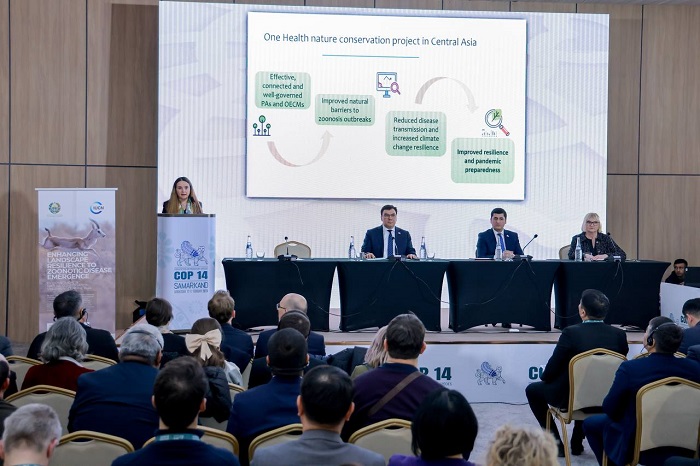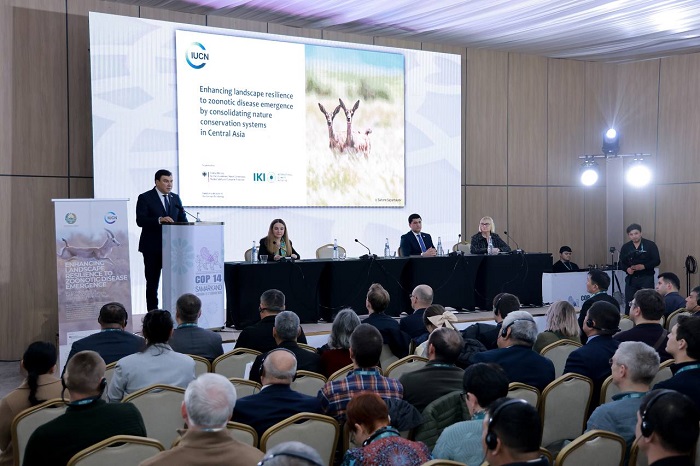A new six-year, €11 million initiative, “One Health in Central Asia,” was launched at the 14th Meeting of the Conference of the Parties to the Convention on the Conservation of Migratory Species of Wild Animals (CMS COP14) in Samarkand, Uzbekistan.
Led by the International Union for Conservation of Nature (IUCN) and funded by the German Federal Ministry for the Environment, Nature Conservation and Nuclear Safety (BMU) through its International Climate Initiative (IKI), the project aims to address the interconnectedness of human, animal, and environmental health.
Officially titled “Enhancing landscape resilience to zoonotic disease emergence by consolidating nature conservation systems in Central Asia,” the project emphasizes a holistic approach to tackling complex issues.
“Nature conservation can contribute to mitigating the risk of zoonotic disease outbreaks. This important new initiative will strengthen the resilience of Central Asian landscapes, and bring numerous benefits to communities. We will continue to support the governments here to build regional capacity to apply IUCN’s tools and standards, including the IUCN Green List, best practices in species management, and the latest advancements in zoonosis research,” said Dr Grethel Aguilar, IUCN Director General.
“Effective implementation of the One Health approach requires collaboration across all levels, from local to international. We are enthusiastic about supporting this comprehensive and ambitious initiative which promises to yield manifold benefits – including disease control, response and management – for the people, animals, and ecosystems of Central Asia,“ stressed Dr Bettina Hoffmann, Parliamentary State Secretary, Federal Ministry for the Environment, Nature Conservation, Nuclear Safety and Consumer Protection.
“Over the past few years, we have observed how the spread of zoonotic diseases like COVID-19 can have a global impact. This has resulted in entire countries being demobilized, transportation connections being disrupted, an increase in food security issues, and massive socio-economic consequences,” said Aziz Abdukhakimov, Minister of Ecology, Environmental Protection, and Climate Change of Uzbekistan. “We are committed to expanding regional cooperation for sustainable management of protected natural areas, preserving unique biological diversity, and contributing to the environmental balance in the Central Asian region, which will receive a significant boost through this project on One Health in nature conservation,” he added.
Amy Frenkel, Executive Secretary of the CMS COP14, highlighted the importance of the One Health approach in Central Asia: “In the diminished and fragmented habitats, migratory species of wild animals often find themselves in contact and competition with livestock for pasture and water which heightens the risk of transmission of disease between these sectors to the detriment of both. Therefore, preserving habitat connectivity not only helps in mitigating the risk of disease outbreaks in wildlife but also reduces the transmission of diseases between wildlife and livestock, and decreases the risk of zoonotic diseases i.e. those affecting humans.”
By addressing biodiversity loss and unsustainable human-wildlife interactions, the “One Health in Central Asia” initiative aims to prevent and mitigate the spread of zoonotic diseases. Experts will work together to:
- Build a robust regional network of protected areas.
- Strengthen conservation measures and wildlife management practices.
- Reduce the risk of zoonotic disease outbreaks.
This collaborative effort, involving all five Central Asian countries and international partners, holds significant promise for protecting human and animal health and ensuring a sustainable future for the region. ///nCa, 15 February 2024 (photo credit – Ministry of ecology of Uzbekistan)

